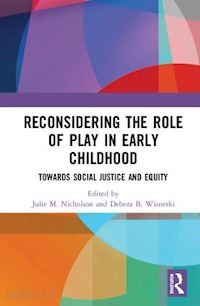Foreword: Is play a privilege or a right? And what’s our responsibility? On the role of play for equity in early childhood education Mariana Souto-Manning Introduction Julie Nicholson and Debora B. Wisneski Part I: Potential and troubles of play in teaching and learning 1. Block play: spatial language with preschool and school-aged children Lynn E. Cohen and Janet Emmons 2. Early childhood curriculum development: the role of play in building self-regulatory capacity in young children Linda R. Kroll 3. Understanding and supporting block play: Video observation research on preschoolers’ block play to identify features associated with the development of abstract thinking Kaoru Otsuka and Tim Jay 4. The relative emphasis of play rules between experienced and trainee caregivers of toddlers Kinga Gyöngy 5. Influencing factors on professional attitudes towards risk-taking in children’s play: a narrative review Martin van Rooijen and Shelly Newstead 6. Follow the leader: attending to the curriculum making potential of pre-schoolers Monica Miller Marsh and Ilfa Zhulamanova Part II: Children’s agency and play 7. Playing at violence: lock-down drills, ‘bad guys’ and the construction of ‘acceptable’ play in early childhood Katherine K. Delaney 8. Where is my stuff? Conceptualizing Hip Hop as ‘play’ Anthony Broughton 9. They’re lovin’ it: how preschool children mediated their funds of knowledge into dramatic play Anne Karabon 10. Civic action and play: examples from Maori, Aboriginal Australian and Latino communities Jennifer Keys Adair, Louise Phillips, Jenny Ritchie and Shubhi Sachdeva 11. Rethinking young children’s digital game play outside of the home as a means of coping with modern life Youn Jung Huh Part III: Troubling spaces for play 12. Playing with power: an outdoor classroom exploration Eden Haywood-Bird 13. Where do the children play?: An investigation of the intersection of nature, early childhood education and play Jeanne M. Brown and Candace Kaye 14. Sandboxes, loose parts, and playground equipment: a descriptive exploration of outdoor play environments Heather Olsen and Brandy Smith 15. ‘They get enough of play at home’: a Bakhtinian interpretation of the dialogic space of public school preschool Jamie Huff Sisson and Janice Kroeger 16. Rooms with gender: physical environment and play culture in kindergarten Hege Eggen Børve and Elin Børve Part IV: Expanding play perspectives 17. Children’s engagement in play at home: a parent’s role in supporting play opportunities during early childhood Doré R. LaForett and Julia L. Mendez 18. Parents’ perceptions of play: a comparative study of spousal perspectives Barbara G. Warash, Amy E. Root and Meghan Devito Doris 19. The social kindergartener: comparing children’s perspectives of full- and half-day kindergarten Kaitlyn Heagle, Kristy Timmons, Fabienne Hargreaves and Janette Pelletier 20. Interpersonal fields of play Sophie Jane Alcock 21. The Black baby doll doesn’t fit the disconnect between early childhood diversity policy, early childhood educator practice, and children’s play Maggie MacNevin and Rachel Berman 22. Using cross-cultural conversations to contextualize understandings of play: a multinational study Zoyah Kinkead-Clark and Charlotte Hardacre











